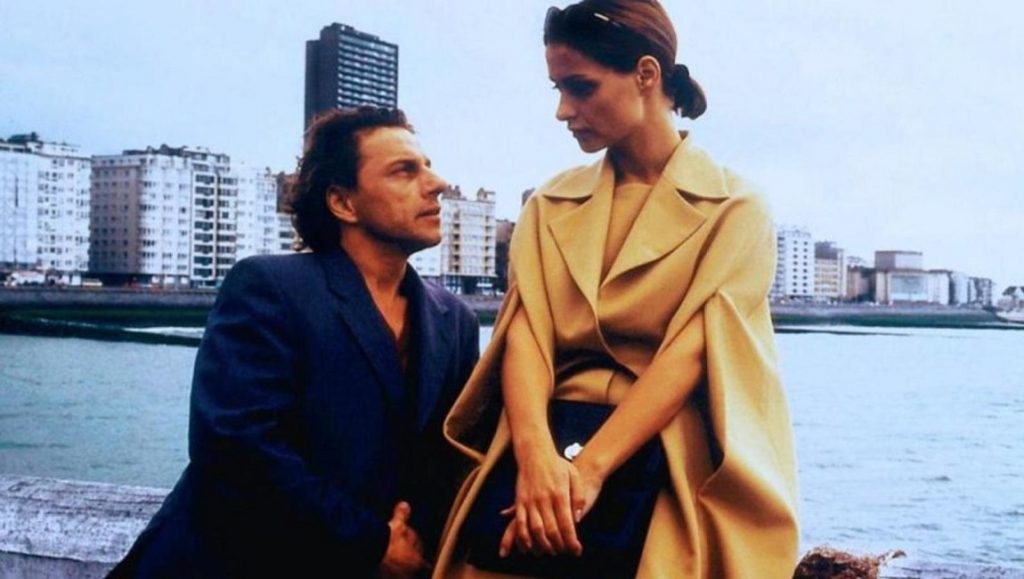Even before his international recognition as one of Germany’s leading filmmakers, Christian Petzold was already cultivating and mastering his thematic and stylistic preoccupations. Bearing his serial enthusiasm for genre alongside his signature undercurrents of fleeting but doomed passion, Cuba Libre, his made-for-television second feature, quietly aches and smolders with a violence wrought by societal malaise. Shot on grainy Super 16, the film remains less characteristic of Petzold’s later works — specifically, the (unofficial) historical trilogy titled Love in the Time of Oppressive Systems — whose sleeker, saturated images evince an established effort, as it were, to reconstruct the past beyond the aegis of nostalgia. Rather, Cuba Libre belongs to those contemporaneous portraits of Germany’s post-reunification which, eschewing inquiries of national guilt in the face of authoritarian complicity, set their gaze upon the socioeconomic contexts that have inevitably preceded, in both past and present, such guilt and complicity. And true to its title, it opens with the promise of intoxicating pleasure: a woman (Catherine Flemming) slumps at a bar counter, barely touching her coffee, awaiting nothing and no one in particular. She hands a CD to the bartender, who slots it into the radio, and out croons the voice of Roy Orbison. “It’s Over,” the ballad, suggests moody reverie, but for Petzold its romance overlaps with the very antithesis of romance: money, the very commodity that puts a price on love and, in doing so, cheapens it.
The intoxicating pleasure quickly fizzles out, replaced by industrial monotony. The bar is situated in a railway station where trains are bound for Nice (“there are jobs there”) and where lockers tucked away from the public eye house the worldly possessions of drifters. Tina, the woman, prostitutes herself there, and it is a particularly brutal encounter with one commuter that spurs into action a narrative of deception and reconciliation involving her ex-lover, Tom (Richy Müller), and a wealthy man named Jimmy (Wolfram Berger) who mysteriously enlists the services of Tom as driver and companion. Headed to Nice in search of sunnier prospects and a more ideal place to nurse the injuries sustained over the years, Tina has hardened her heart against Tom’s persistent efforts to reunite, he having betrayed and stolen from her their savings for a future together in Cuba. Jimmy’s steady claim to Tom’s trust, meanwhile, eludes the latter’s haggard cynicism; destitute and dishonest, little of either his character or circumstance would appeal to the man who willingly permits Tom to steal wads of cash from him, beyond the gleeful presumption of material superiority and control. “You look like an impresario. I tried everything, but I never shed the errand boy,” Jimmy admits with some fatalism. Seeking both redemption and reward in a road trip unfurling across the barren marginalia of newfound capitalism, Tom embarks on an adventure in a netherworld of crime and murder missing its crucial sense of adventurism, but finds neither.
Transplanting the post-war sensibilities of Edgar G. Ulmer’s 1945 American noir Detour onto a landscape of perpetual economic insecurity some 50 years later, Cuba Libre starkly observes an existential disquiet amid the dystopian backdrop of European neoliberalism, according its autobahns and bourgeois establishments a drab, colorless appearance. At the heart of its screenplay, penned by Petzold and his long-time collaborator Harun Farocki, lies a disheartening circularity of individual actions, blindly guided by the invisible hand of capital. For Tom and Tina, two dead-end nobodies in a society that has largely forgotten them, the path ahead is murky and indistinct, and as they circle around each other, she dreams of the surgeries that would reverse the decaying of her teeth and rectify her lungs that they may taste fresh air again. As with Yella, Petzold’s sublime re-imagining of Herk Harvey’s Carnival of Souls, Cuba Libre precludes the optimism of escaping towards its impossible object of desire — the mythical and unseen Cuba — and Flemming’s performance, as precursor to Nina Hoss’, embodies a gaunt desolation only fitting in the face of this inescapability. The predictable machinations of double-crossing and deceit soon render an already stifling atmosphere stale, under which identities are switched, altered, and transformed to little more than cosmetic effect. A realization dawns on Tom as he converses with a salesgirl, that in enslaving oneself to the permanence of money all other allegiances acquire nothing but transience: “How long does a woman’s revenge last? […] I stole from her.” “A year.” “And abandoned her.” “Forever.” And enslaved to the very end are the film’s characters who, in fighting to assert some agency within a land of clockwork efficiency, find themselves ruthlessly governed by it. Tom and Tina eventually do reach their destination, but this “Cuba Libre” is yet another bar in the suburbs. With Petzold, the sound of freedom is yet another illusion.
Part of Christian Petzold: In the Cut.


Comments are closed.